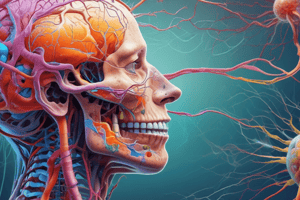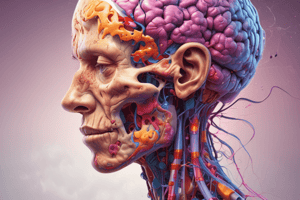Podcast
Questions and Answers
Which of the following is NOT a type of nervous or neurological disorder?
Which of the following is NOT a type of nervous or neurological disorder?
- Epilepsy
- Migraine (correct)
- Alzheimer’s
- Parkinson’s
What is a common symptom associated with nervous disorders?
What is a common symptom associated with nervous disorders?
- Changes in cognition (correct)
- Skin rashes
- Swelling in joints
- Shortness of breath
Which factor is considered a risk factor for developing neurological disorders?
Which factor is considered a risk factor for developing neurological disorders?
- Hydration levels
- Consistent exercise
- High-fiber diet
- Genetics (correct)
Which of the following is a degenerative cause of neurological disorders?
Which of the following is a degenerative cause of neurological disorders?
What is a key dental consideration when treating patients with neurological disorders?
What is a key dental consideration when treating patients with neurological disorders?
Which condition is typically associated with changes in sensation as a symptom?
Which condition is typically associated with changes in sensation as a symptom?
What type of infection can lead to neurological disorders?
What type of infection can lead to neurological disorders?
Which of the following is NOT considered a modification necessary when treating someone with a neurological disorder?
Which of the following is NOT considered a modification necessary when treating someone with a neurological disorder?
Which of the following best describes the importance of obtaining a comprehensive patient history?
Which of the following best describes the importance of obtaining a comprehensive patient history?
What is a key reason for assessing patients' levels of anxiety regarding dental care?
What is a key reason for assessing patients' levels of anxiety regarding dental care?
When managing patients with neurological disorders, what should be prioritized?
When managing patients with neurological disorders, what should be prioritized?
Which of the following actions is essential before starting treatment?
Which of the following actions is essential before starting treatment?
Which statement about the role of the dental team is accurate?
Which statement about the role of the dental team is accurate?
What should be recognized when discussing the impact of medical conditions in patients?
What should be recognized when discussing the impact of medical conditions in patients?
Why is it important to recognize and take responsibility for the quality of care provided to patients?
Why is it important to recognize and take responsibility for the quality of care provided to patients?
What should be a focus of preventive education provided to patients?
What should be a focus of preventive education provided to patients?
Flashcards are hidden until you start studying
Study Notes
Nervous Disorders
- Physical conditions/diseases affecting the central and peripheral nervous systems
- Central Nervous System conditions: Brain tumours, Encephalitis, Epilepsy, Meningitis, Multiple Sclerosis, Alzheimer’s, Parkinson’s, and Huntington’s
- Peripheral Nervous System conditions: Peripheral neuropathy (e.g. Carpal tunnel, Diabetic polyneuropathy, Guillain-Barré syndrome, Sciatica, Facial nerve paralysis)
Causes
- Congenital
- Vascular
- Infection (fungal, viral, bacterial, parasitic)
- Degenerative
- Trauma
- Environmental
- Risk factors (habits, other conditions, gender, age, genetics)
Presentations
- Pain
- Muscle malfunction
- Changes in sensation
- Changes in the special senses
- Sleep problems
- Changes in consciousness
- Changes in cognition
- Other symptoms:
- Dysphagia (difficulty swallowing)
- Dysarthria (difficulty speaking)
- Variability in presentation across each condition
Dental Implications
- Medication side effects
- Medication interactions
- Consent
- Access
- Compliance with treatment
- Behavior management
- Impaired memory
- Special considerations/equipment
Presentation Requirements
- Poster design (mind map, PowerPoint slide)
- Include:
- definition
- cause
- treatment
- dental implications
- dental treatment modifications
- Please reference any sources (on separate page)
Presentation Groups
- Dementia (Aneesha, Anna, Annabelle, Asli)
- Motor Neurone Disease (Ayesha, Brooke, Emily, Faye)
- Huntington's Disease (Gabriela, Hadia, Jasmine)
- Cerebral Palsy (Jessica M, Jessica O, Julie)
- Stroke (Kanaith, Katya, Manjeeta)
- Parkinson's Disease (Manoju, Mentalah, Mohammed)
- Epilepsy (and seizures) (Nicole, Rachael, Uzair, Zahrah)
Studying That Suits You
Use AI to generate personalized quizzes and flashcards to suit your learning preferences.




